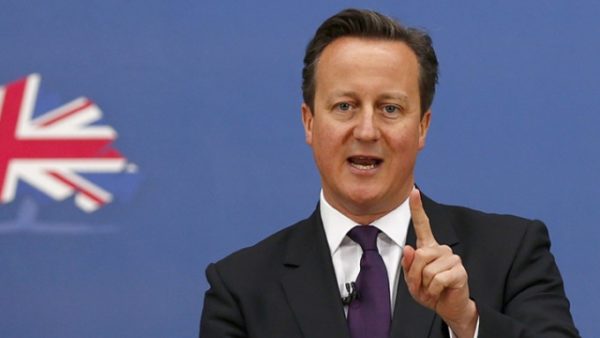Remain in EU or leave, workers must fight for socialist change
Judy Beishon, Socialist Party England & Wales
“Every household will lose £4,300 a year,” proclaim British PM Cameron and Finance Minister Osborne to spread fear and increase the chance of a Remain vote in the European Union (EU) referendum.
As most of big business wants Britain to stay in the EU, the government’s warnings have been vocally backed up by many institutions of capitalism, including the OECD and IMF, along with prominent individuals from Obama in the US to the prime minister of Japan. The UK is threatened, they argue, with investors fleeing, the pound plummeting, prices rising, trade volumes falling and all manner of other calamities – which would all impact badly on living standards.
The spectre of renewed recession has also been raised by Osborne and Bank of England governor Mark Carney. But the economy is on the brink of another recession anyway!
Already British industry has nosedived into its third recession in eight years; the trade deficit is increasing – including with the rest of the EU – and productivity growth continues to be low.
Consumer spending is unsustainable at current levels – households have a bigger debt-to-income ratio than in the run-up to the 2007-2008 crisis.
So it is not surprising that with the referendum opinion polls still almost neck and neck, they are panicking at the prospect of added economic instability and hits on corporate profits in the event of ‘Brexit’ (British exit).
In response to the ‘project fear’ on living standards, many people will say “what’s new?” Brutal austerity has been inflicted for a decade, whether the economy has been growing or not, including the rigid holding down of public sector pay.
Many working class and middle class people are struggling to get by and a layer will vote for Brexit to express anger towards the parliamentary parties and EU institutions that have been supporting cuts in services and other attacks on living standards. Whether Britain ends up in or out of the EU the struggle against austerity will go on.

However, another layer of young people and workers are leaning towards voting Remain because they fear being forced to pay the price of a worsening economy following a Brexit. This concern is understandable, especially after witnessing the bailout of the bankers after the 2007-08 crisis at the expense of the majority in society.
But the living standards of workers in Britain will not depend on the level of profit being made by the major industries and services in the months and years after the referendum. Rather, they will depend on how far working class people manage to go in mobilising through the trade unions against both the austerity policies of the government and private sector bosses’ attempts to drive down pay and conditions.
“Trickle down” theory – that all layers of society benefit from wealth creation at the top – has been shown to be a sham, with an obscene level of enrichment within the top 1 percent. Oxfam calculated that the five richest families in Britain now have more wealth than the poorest 20 percent – over 12 million people!
How will a Remain victory, a vote of confidence in Cameron and Osborne, reverse these trends?
Just as it is against the interests of working class people to vote in a general election for the Tories on the grounds that they are the first-choice team for the capitalist markets, likewise it is against workers’ interests to vote for the capitalist EU.
Events in Greece have clearly shown which class the EU serves. With mass support behind it to oppose the EU diktats, the formerly left Syriza government could have moved to take fundamental measures in workers’ interests – including taking the banks and other key companies into public ownership under workers’ control and management and introducing democratic socialist planning of the economy. Instead it surrendered to the pressure of the EU and the capitalists.
Today in Britain, whatever the extent of losses suffered by big business as a result of a Brexit or a new recession, they do not have to be passed onto ordinary people.
The six million strong trade union movement has the power to mobilise effective mass resistance if enough pressure is put on its leaders to do so. This must include demanding the nationalisation of any large company threatening job losses, and assistance for small companies facing difficulties.
Also, Labour Party leader Jeremy Corbyn must be held to his welcome anti-austerity stance, through building on the surge of support that elected him as leader and turning it into an organised form – providing political representation for ordinary people.
Unfortunately Jeremy Corbyn and John McDonnell have departed – under pressure from Labour’s right wing – from the Labour left’s historic position of opposition to the capitalist EU and its forerunners. They are now echoing the Tory government’s propaganda by sending out Labour leaflets and social media messages saying that Brexit would threaten jobs and wages.

Capitalist fears
How deep and long term would the negative repercussions of Brexit be for British capitalism?
Britain’s ruling class through their representatives in successive governments, were part and parcel of creating the EU in the mutual interests of the top corporations across Europe.
While, at the same time, even the most pro-EU capitalists are competing with each other across the continent, they have made sure that overall, the EU treaties uphold their profit-making interests.
They better enable their enrichment on the European and global arena and their exploitation of the European working class, through ‘market liberalisation’ agreements and anti-working class measures.
In the event of Brexit, despite threats by European capitalist politicians of reprisals, corporations across Europe would want to minimise interruption to their trade with the UK. Nevertheless, an exit vote would still be a major setback for the British ruling class, for their prestige and influence, as well as economically.
Clearly not every capitalist in Britain thinks Brexit would be a bad thing for the economy and some think they would benefit from it, along with many small businesses.
They decry the declining weight of British industry in Europe and globally and believe that ‘free trade’ outside the ‘protectionist trade agreement’ of the EU could flourish. But while staying in the EU will not lead to a new era of prosperity, neither will leaving it. Either way, British capitalism is a sick entity in an anaemic European and world economy. The ‘outers’ are much divided on the economy and tie themselves in knots when seeking a model for exit – right-wing pro-Brexit politician Michael Gove was ridiculed for citing Albania as an example.
So they turn heavily to the issue of immigration, but also are leaning on anti-establishment feeling. For example, Tory MP David Davis said that the single market benefits “big companies to the detriment of small businesses” and former Tory minister Iain Duncan Smith attacked the EU as “a friend of the haves rather than the have nots”.
But pro-Brexit politicians like Boris Johnson, Gove and Nigel Farage believe that leaving the EU will make it easier for bosses to pursue a ‘race to the bottom’ in their workforces’ pay and conditions.
The economic arguments of socialists are the polar opposite of those being used by right-wingers whether in the Remain or Leave campaigns.
It is crucial that the anti-capitalist and socialist ‘vote Leave’ message of the Trade Unionist and Socialist Coalition (TUSC)* and the Socialist Party is heard as widely as possible in the coming weeks, as the only position that can be taken in working class interests.
* Trade Unionist and Socialist Coalition: an alliance of left organisations and radical trade unions that seeks to build a new working class party to the left of Labour. The Socialist Party (CWI section) is an active part of TUSC.




